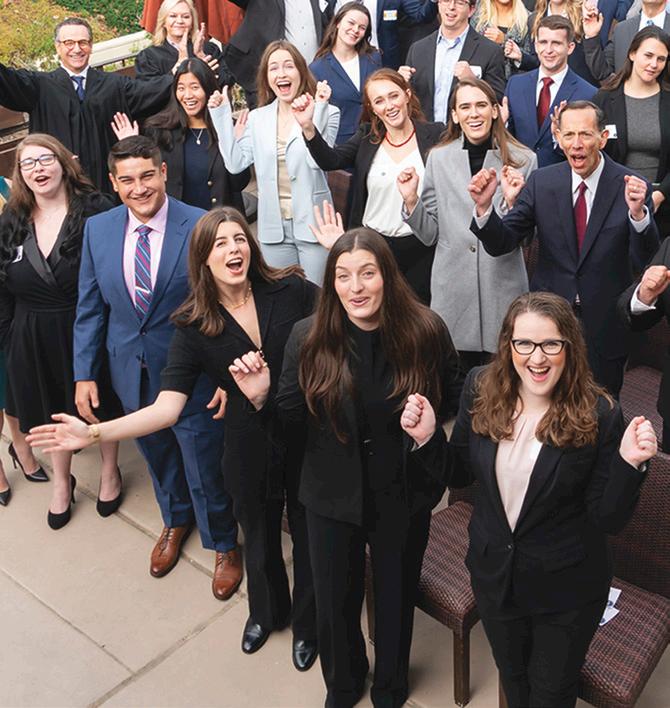University of San Diego School of Law
Plus: The USD Promise helps students and recent graduates launch their careers / Alumni thrive in Southern California / The law school enhances its renowned Tax LLM


Plus: The USD Promise helps students and recent graduates launch their careers / Alumni thrive in Southern California / The law school enhances its renowned Tax LLM

USD Law offers robust educational programs and free legal services to former service members
On the cover: Members of USD School of Law’s extensive military-connected community.
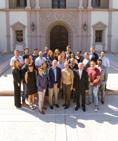 SENIOR ADMINISTRATORS
SENIOR ADMINISTRATORS
Robert A. Schapiro, JD
Dean and C. Hugh Friedman Professor of Law
Margaret A. Dalton ‘94 (JD)
Vice Dean and Professor of Law Emily Nagisa Keehn, JD
Assistant Dean for Law Student Affairs
Stephanie Kiesel ’11 (JD)
Assistant Dean, Finance and Administration
Judith Lihost ‘97 (JD)
Assistant Dean and Director of Legal Research Center, Professor of Legal Research Debbie Rider ‘84 (JD)
Senior Director of Development Tracy Simmons, JD
Assistant Dean, Admissions, Diversity Initiatives and Financial Aid
Marti Worms, JD
Assistant Dean, Career and Professional Development
2022-2023
Chair of the Board
Alan K. Brubaker ’76 (JD)
Members
Derek Aberle ’96 (JD)
Hon. Olga Álvarez ’02 (JD)
G. Edward Arledge ’73 (JD)
Hon. Richard Aronson ’72 (BA), ’75 (JD) (ret.)
Jim W. Baker, JD
Richard M. Bartell ’75 (JD)
Angela A. Bartosik ’93 (JD)
Adam J. Bass ’88 (BA), ’91 (JD)
Hon. Michael S. Berg ’81 (JD)
Erin M. Bosman ‘94 (BBA), ‘99 (JD)
Carolina Bravo-Karimi ’08 (JD)*
Matthew J. Bresnahan ’07 (JD)
Robert S. Brewer Jr. ’75 (JD)
Benjamin C. Bunn ’89 (JD)
Elizabeth “Libby” Carson, JD**
David S. Casey Jr. ’74 (JD)
Steven J. Cologne ’84 (JD)
Dennis J. Doucette ’86 (JD)
Stephen P. Doyle ’84 (JD)
Bibianne U. Fell ’04 (JD)
Michael A. Ferrara Jr. ’72 (JD)
Thompson Fetter ’67 (JD)
Gordon L. Gerson ’76 (JD)
Erin P. Gibson ’03 (JD)
Robert H. Gleason ’98 (JD)
Hon. Allison H. Goddard ’00 (JD)
Susan S. Gonick ’86 (JD)**
Hon. J. Richard Haden ’74 (JD) (ret.)**
Robert J. Hanna ’75 (JD)
John R. Henkel ’77 (JD)**
Karen P. Hewitt ’89 (JD)
Denise Hickey ’94 (JD)
Hon. Richard Huffman, JD**
Steven R. Hunsicker ’75 (JD)
Faye Hunter ’90 (JD)
Shaka H. Johnson ’03 (JD)
Michael B. Kaplan ’72 (JD)**
Kimberly M. Koro ’86 (JD)
Hon. Melinda J. Lasater ’73 (JD)**
Patrick W. Martin ’92 (JD)
Hon. Judith McConnell, JD**
James R. McCormick Jr. ’97 (JD)
Jack McGrory ’81 (JD)
Edwin F. McPherson ’82 (JD)
Haida Massoud Mojdehi ’94 (JD)
John L. Morrell ’84 (JD)
A. John Murphy Jr. ’72 (BA), ’75 (JD)
Ryan A. Murr ’98 (JD)
Andrea Myers ’08 (JD)
Virginia C. Nelson ’79 (JD)**
Hon. Louisa S Porter ’77 (JD) (ret.)
Michael J. Rider ’83 (JD)
Kristin Rizzo ’06 (JD)
Paul E. Robinson ’73 (JD)
Frank E. Rogozienski ’71 (JD)
Dean Robert A. Schapiro, JD*
Frederick Schenk ’78 (JD)
Congresswoman Lynn Schenk ’70 (JD)
Edward P. Schlesier ’89 (BBA), ’00 (JD)
Gary W. Schons ’73 (BA), ’76 (JD)
Ronson J. Shamoun ’98 (BAA), ’02 (JD), ’03 (LLM)
Thomas E. Sharkey ’59 (JD)**
Susanne Stanford ’75 (JD)**
Todd F. Stevens ’88 (JD)
George G. Strong Jr. ’74 (JD) Jeffrey T. Thomas ’82 (JD)
Hon. Robert J. Trentacosta ’79 (JD)
Vickie E. Turner ’82 (JD)**
Christopher Wesierski ’78 (JD)
Charles B. Witham ’98 (JD), ’99 (MBA)
*ex-officio member **emeritus member
2022-2023 LAW ALUMNI BOARD
President Carolina Bravo-Karimi ’08 (JD)
President-Elect Katherine L. Parker ’02 (JD)
Immediate Past President Megan L. Donohue ’09 (JD)
Matthew L. Abbot ’15 (JD)
Dylan M. Aste ’11 (JD)
Beth K. Baier ’84 (JD)
Alan H. Barbanel ’82 (JD)
Ross E. Bautista ’16 (JD)
Diane Byun ’20 (JD)
David S. Casey III ’18 (JD)
E. Scott Dupree ’77 (JD)
Robert K. Foster ’19 (JD)
Nicholas J. Fox ’11 (JD)
Douglas J. Friednash ’87 (JD)
Kirsten F. Gallacher ’12 (JD)
Jonathan L. Gerber ’07 (JD)
Erin F. Giglia ’01 (JD)
Benjamin Gourley ’20 (JD)
Bridget Gramme ’98 (BA), ’03 (JD)
Joy Utomi Hartmann ’11 (JD)
Christopher B. Hayes ’10 (JD)
Ashley T. Hirano ’09 (JD)
Curtis M. Jackson ’18 (JD)
Knut S. Johnson ’86 (JD)
Julianna H. Kat ’16 (JD)
Professor Michael B. Kelly, JD
Alex L. Landon ’71 (JD)
Marty B. Lorenzo ’93 (BA), ’96 (JD)
Brett Norris ’02 (JD)
Jason M. Ohta ’00 (JD)
Darshan Patel ’16 (JD)
Teodora D. Purcell ’01 (LLM)
Patrick C. Swan ’15 (JD)
Francis J. Tepedino ’74 (JD)
Hon. Victor M. Torres ’84 (BA), ’88 (JD)
Noel B. Vales ’97 (JD)
Hon. Christopher T. Whitten ’91 (JD)
Carson C. Williams ’20 (JD)
Jessica G. Wilson ’02 (BA), ’06 (JD)
Editors
Eli Roberts ’22 (BA)
Catherine Spray
Contributors
Brigid Bennett ’81 (BA)
Katie Gonzalez ’98 (BA)
Shari Baurle Green Stacee Groff
Jeanette Nichols Debbie Rider ‘84 (JD)
Photographer Grace Goodale
Design Diablo Custom Publishing
Advocate is published by the University of San Diego School of Law Department of Communications.
Please address all correspondence to: Advocate University of San Diego School of Law 5998 Alcalá Park
San Diego, CA 92110-2492
Email: lawpub@sandiego.edu © 2022 USD School of Law
USD Law is dedicated to assisting former service members with free legal aid and expanded educational opportunities.
A bold initiative helps students and recent graduates gain meaningful work experiences.
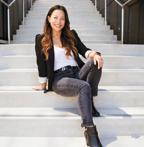
From entertainment lawyers in Los Angeles to entrepreneurs in Orange County, USD Law grads are making their mark in the region.
18
’AN
The law school’s jurist in residence, M. Margaret McKeown, discusses how she balances jurisprudence, academia and scholarly pursuits.
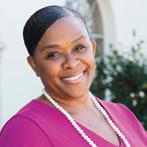
New programs enhance the breadth and depth of USD Law’s renowned LLM in Taxation program.
2 DEAN’S
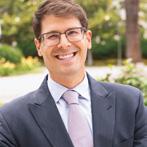
Robert A. Schapiro reflects on USD School of Law’s abiding commitment to students, faculty and alumni, including its large military-connected community.
3 DISCOVERY
Updates on USD Law newsmakers and events, including SBA President Sarah Dahm, Professor Alysson Snow of the Housing Rights Project, the 2022 Big Give and more.
22
News about faculty members’ scholarly publications, achievements and activities.
28 CLASS ACTION
Catch up with the personal and professional lives of alumni. Plus: Meet Justin Hollander, ’04 (JD), the new executive vice president and general manager of the Seattle Mariners.
33 IN MEMORIAM
USD School of Law mourns the passing of alumni and friends.
34 CONNECTING ALUMNI
Were you there? Photos from alumni events and reunions.
This issue of the Advocate honors our veterans and military-connected students. The School of Law is proud of the multiple ways in which we partner with and help to support those who serve their country. We are honored to participate in the USD Yellow Ribbon school program, which provides comprehensive scholarships for military-connected students, and in the USD Military and Veterans Program, which helps veterans transition from military to academic life.
This fall we are celebrating the 10th anniversary of the Veterans Legal Clinic. The clinic has an experienced staff led by Professor Robert Muth, the clinic’s managing attorney and a U.S. Marine Corps veteran. The Veterans Legal Clinic is part of USD’s deep and long-standing commitment to clini cal education. Last fall, we marked the 50th anniversary of our Legal Clinics. This past spring, with the support of Price Philanthropies, we initiated our newest clinical program, the Housing Rights Project, which represents tenants facing evic tion. With additional major support from the California State Bar Foundation, the project will become another distinct clinic this spring. Through the Legal Clinics, our students serve our community, while learning important practical legal skills.
Those clinics constitute a cornerstone of the USD Promise, our commitment to ensure that all of our students have the opportunity for meaningful practical experience during their time at USD. Along with our clinics, the Experiential Advocacy Practicum and the Centers for Public Interest Law, the USD Promise encompasses a new Law Firm Externship program and an expanded public interest fellowship for students work ing at a nonprofit or a government agency for the summer. Our students are at the center of every decision made at the law school, and these programs help to launch our students into flourishing careers.
Our renowned faculty are path-breaking scholars and dedicated teachers. I am delighted that we were able to rec ognize four outstanding faculty members with new endowed professorships: Miranda Fleischer, the Richard and Kay Woltman Professor of Finance; Adam Hirsch, the inaugural Napoleon Jones Professor of Law; Michael D. Ramsey, a Warren
Distinguished Professor of Law; and Ted Sichelman, the inaugural Judith Keep Professor of Law. “Faculty Footnotes” gives an overview of faculty events and updates, including a look at Professor Orly Lobel and her new book, The Equality Machine; Professor Dov Fox and his trailblazing scholarship; and newly hired Associate Professor Michelle D. Layser. For a sampling of our faculty’s illuminating insights, you can read the second edition of the Blue Brief, which contains analy sis of significant decisions from the recent momentous term of the United States Supreme Court.
We were very pleased to welcome key new members to our leadership team, including Tracy Simmons, assistant dean of admissions, financial aid and diver sity initiatives, and Karen Sigmond, ’96 (JD), senior director of graduate, international and certificate pro grams. Karen and Tracy will ensure that we continue to attract the most outstanding students for all of our programs.
Reasons for optimism abound. It is an exciting time at our law school. I am continuously inspired by our wonderful students, staff, faculty and alumni. I look forward to seeing you on campus!
A. Schapiro Dean and C. Hugh Friedman Professor of Law
Sarah Dahm wants to be an advocate for those without a voice
Sarah Dahm, 3L, always knew she wanted to make a posi tive impact on people’s lives. As an undergraduate student on the pre-med track at the University of Arizona, it seemed as if she would do so as a doctor. Yet while she was the president of her sorority, Dahm discovered something that pro foundly altered her plans: the power of advocating for others.
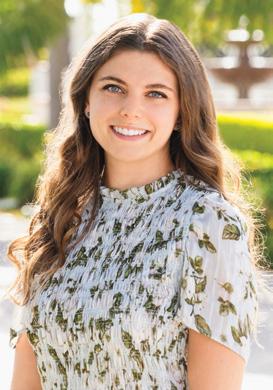
The opportunity to create tangible change through advocacy prompted Dahm to trade in her lab coat for a suit jacket, and her heavy medical books for the equally heavy legal casebooks. Now, as the president of the Student Bar Association, Dahm advocates for change on an almost daily basis.
Dahm says one class in particular–a 1L class taught by Professor Roy Brooks–validated her decision to eschew medical school for law school. Brooks’ class emphasized the positive impact that legal advocacy for historically underrepresented and marginalized groups can have on society. Dahm says it was also Brooks’ class that made her want to someday become a judge who takes a critical view when examining issues of class, race and gender.
With an eye toward advocating for others, Dahm joined the Diversity, Equity and Inclusion board of the SBA during her 1L year. As a 2L, she served as SBA treasurer. Never satisfied, Dahm then ran for SBA president, a position she believed would give her the best opportunity to make tangible changes.
As the SBA president, Dahm sees an opportu nity to be an active participant in others’ stories. Her vision is akin to the perspective that Professor Brooks shared with her on day one of law school. She wants the SBA to consider the values and experiences of the nonrepresented and those who don’t always have a voice, and validate those experiences. She believes it is the duty of both the student body and the School of Law as a whole to keep up with the times and adapt to meet the needs of students in an ever-changing society. “We become more competitive,” said Dahm, “when we show the world that we are ready to be revolutionary.”
reach into Latin America and build bridges more generally into other countries. At the same time, she is exploring opportunities to expand beyond the JD, including certificate programs and our Master of Science in Legal Studies. She brings great experi ence and creativity to this mission.”
Sigmond was born to Mexican immigrant parents and grew up near the Mexican border in California’s Imperial Valley. Her first language was Spanish. While earning her law degree at USD, she traveled to Mexico during two summers and decided she wanted to pursue an international career after working for attorneys who served as panelists in the NAFTA disputes.
In 1999, she moved to Mexico City to work for Tecnológico de Monterrey, first as a professor and then as director of its graduate law programs. During those years, she also taught courses in inter national business transactions and NAFTA as part of USD Law’s Summer Abroad Program.
As a lawyer and educator who has long specialized in international law, Karen Sigmond, ’96 (JD), recently stepped into a position as USD School of Law’s senior director of graduate, international and certificate programs.
“It is a job that the universe created for me,” said Sigmond. “It covers everything I’m interested in.”
Dean Robert A. Schapiro calls Sigmond’s new role critical to the law school’s path forward.
“A key priority of USD Law is to extend our educational reach beyond the JD and beyond the U.S.,” Schapiro said. “Karen is able to help us identify important opportunities to expand our
Returning to the United States in 2018, she served as the associate director of the Instituto Latinoamericano de Derecho y Justicia at California Western School of Law before starting at USD this year. One of the programs she is directing is the LLM, which is often chosen by foreign law yers wishing to gain a better understanding of the U.S. legal system. In addition to LLM programs in Taxation and International Law, among others, USD Law recently added a Comparative LLM in Spanish, launching in summer 2023.
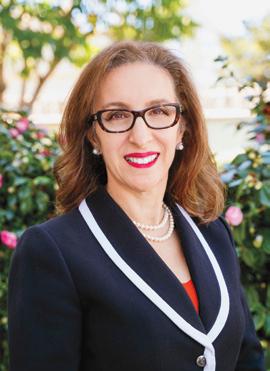
Sigmond says that USD Law presents great opportunity for growth in the international realm.
“We have the door to Latin America right here and can build networks,” she said. “There’s so much we can do because of our location, the strength of our programs and what our faculty have to offer.”
Every spring, USD School of Law invites members of the community to participate in the Big Give—a 36-hour online campaign to support the law school in a wide variety of ways. Gifts large and small are always welcome and go toward academic programs, student scholarships, fellowships, employment opportunities, assistance for veterans, advances in technology and much more.
As the legal profession continues to evolve at a rapid pace, it is more important than ever to invest in USD School of Law— through the Big Give or other efforts—so that the law school will be able to provide an outstanding, innovative and relevant education for generations to come.
This year’s Big Give, which took place on April 13 and 14, raised more than $358,000. Many of the 326 donors to the campaign were alumni, but generous gifts were also made by USD employees, friends and community leaders.
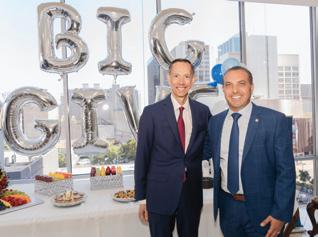
One new component of the 2022 Big Give was the Law Student Casebook Campaign. With the cost of casebooks often out of reach for many students, this year’s campaign
• $358,000 total funds raised
• $160,640 raised for student scholarships
• $140,000 in challenge gifts
• 326 total donors
focused on funding a casebook collection in the library as well as funding grants to students who apply for casebook relief.
Building on the success of past giving campaigns, USD School of Law is already looking forward to the 2023 Big Give, which will mark the campaign’s 10th anniversary. The school encourages those interested in donating to save the dates—March 29 and 30, 2023—and show their support by participating in this game-changing initiative.
“This is a defining moment for USD Law, and the support of our community is vital,” said Debbie Rider, ’84 (JD), the law school’s senior director of development. “Our future rests in the hands of those who have sustained the school and those who will continue to do so going forward. Our donors are the difference makers who serve as an inspiration for the next generations.”
Once a year, USD holds a university-wide, daylong fundraising campaign known as Torero Tuesday. It’s an opportunity to show support for all facets of USD, including the law school. The 2022 day of giving was Oct. 11. The law school was the beneficiary of more than $269,000 and would like to express deep grati tude to the alumni, family and friends who showed their unstinting support. Thank you!
Build new bonds and renew old ones through USD School of Law’s Alumni Affinity Networks
The law school recently launched a series of Alumni Affinity Networks to reinforce connections among diverse alumni. These groups bring together alumni—and allied alumni—based on race, ethnicity, national origin, sexual orientation, gender identity and gender expression.
Supporting these groups is a top priority of the Law Alumni Association, which seeks to create networking oppor tunities and mentoring relationships between students and alumni, contribute to pipeline programs to increase diver sity in the legal profession, and promote programs that benefit the entire alumni community. The Affinity Networks will not only engage with other alumni and interact with various regional alumni chapters, but they will also participate with student organizations as panelists, speakers and event guests.
To date, the law school has announced the launch of Affinity Networks for these groups:
• Asian Pacific Islander alumni
• Black alumni
• Latinx alumni
• LGBTQ+ alumni
• Middle Eastern alumni
To learn more about participating in one or more Alumni Affinity Networks, contact Shari Baurle Green at sbaurle@ sandiego.edu.
Alysson Snow, who oversees a new Housing Rights Project within the Legal Clinics, is committed to keeping marginalized community members in their homes
When the 2008 financial crisis hit, USD Professor of Practice Alysson Snow did what so many others found impossible to do. She ditched the cushy, high-paying job at a multinational law firm to do what she had dreamed of doing since deciding to study law: become an advo cate for the marginalized and neglected. Snow joined the Legal Aid Society of San Diego‘s Consumer Protection Division, where she has worked to keep low-income families in their homes and fought against predatory lending schemes.
While little was guaranteed when Snow took the leap to the Legal Aid Society of San Diego, it is a decision she has never regretted. Her passion to help others was fostered at a young age, growing up in a low-income family of her own. Her motivation to keep going comes from every client she helps along the way.
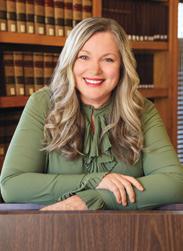
“Every time we were able to make a client’s life better is almost a weekly reminder of why you do things,” said Snow. “It’s an honor to be able to represent the people that we do.”
Snow now joins the USD School of Law faculty to supervise and teach in the new Housing Rights Project, which is a part of the USD Civil Clinic. She sees it as the perfect opportunity to combine her love of teaching with her burn ing desire to fight for change.
Snow envisions the Housing Rights Project as a strong voice for marginalized people in the San Diego community. By help ing people stay in their homes, the project will strengthen the community as a whole. For Snow, the opportunity to provide everyone with equal access to justice, regard less of how much money they have, is what makes her decision to leave the world of corporate law worth it.
In her new role at USD Law, Tracy Simmons is committed to making legal education more accessible and inclusive
As the new dean of admissions, financial aid and diver sity initiatives, Tracy Simmons says the highlights of her years of experience in law school admissions have often centered around helping students to reach their dreams despite obstacles.
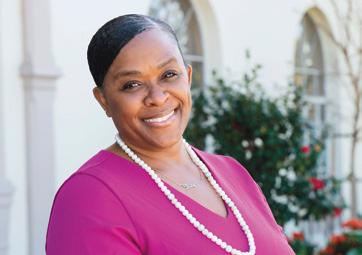
“The best moments involve students who were told they could not become lawyers because of a speech impediment, learn ing disability, family background or mistakes from their past,” Simmons said. “I get to be there for the beginning of their path to law, encouraging them through the application and financial aid process, and then I get to walk with them at graduation. Their pride and confidence are powerful. It is a beautiful thing.”
A native of the Inland Empire whose father served in the U.S. Air Force for 28 years, Simmons says most of her family mem bers do not have education beyond high school, but they and others “encouraged me and showed up at all of the critical high points and low points and pushed me to keep going.” Simmons earned a bachelor’s degree in psychology and a master’s degree in education from San Diego State University and a law degree
from Golden Gate University School of Law.
She says her background “gives me insight and perspective into our applicants and students. They come from all sorts of families and countries, and their life experiences dictate how they show up in the space.”
USD School of Law Dean Robert A. Schapiro expressed great enthusiasm for Simmons.
“Tracy Simmons has the perfect background to help the law school advance in the critical areas of admission, financial aid and diversity,” Schapiro said, “as we continue to try to attract the most out standing diverse students and provide the kind of financial support to make a USD education acces sible and affordable to a broad range of students.”
Simmons came to USD from McGeorge School of Law at the University of the Pacific. In her new position, she says she wants to promote USD School of Law’s many assets.
“The law school is rich in terms of programs, experiential learning opportunities, service to the community, creativity and talent of our students and our alumni,” she said. “There is amazing work being conducted in the clinics and centers that is changing lives. I would like to celebrate the accom plishments of our students, alumni and faculty as loudly as possible.”
Simmons says she would also like to work with her team, the dean and other colleagues on diver sifying the law school, the San Diego bench and bar, and “ultimately the law profession in general. I’d like to create a space where all our students’ voices are valued and contribute to the fabric of who we are.”
With so much planned, Simmons says she is delighted to be back in San Diego.
“When this position presented itself, I was truly excited about returning to the city where my higher education journey began,” she said. “It has been a wonderful transition to America’s most beautiful city and to a beautiful campus.”
→ USD School of Law is pleased to announce the release of the second annual Blue Brief, a faculty review of 10 carefully selected rulings from the 2021-2022 term of the United States Supreme Court.
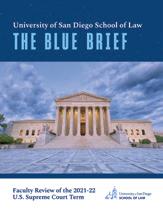
Nine faculty members offer assess ments of cases ranging across a variety of topics, including abortion, gun rights, prayer in the execution chamber, free speech, free exercise of religion, arbitration, administra tive law, federal Indian law, climate change and vaccine mandates.
This was indeed a momentous term in many respects. The court’s
decisions charted new paths in several significant areas of the law. This term also marked the end of Justice Stephen Breyer’s long and illustrious tenure on the court. This summer witnessed the accession to the court of Justice Ketanji Brown Jackson, a dis tinguished jurist who is the first Black woman to serve as a Supreme Court justice. This term was also notable for the unprecedented leak of a full draft of a Supreme Court majority opinion. We look forward to reporting back to you in the summer of 2023 with a new edition of the Blue Brief, which will cover the court’s 2022-2023 term.
USD School of Law holds panel discussion on the far-reaching implications of leaked SCOTUS opinion
In May 2022, when a draft of the majority opinion in the high-profile abortion case pending in the United States Supreme Court, Dobbs v. Jackson Women’s Health, was leaked to the public, the USD School of Law faculty felt that they had a duty to inform USD and the broader San Diego legal communities about the implications of the leak. To do so, they organized an hourlong virtual panel called “The Dobbs Leak, the Supreme Court, and the Future of Roe v. Wade.”
The panel, moderated by Associate Dean of Faculty and Herzog Research Professor of Law Mila Sohoni, discussed the leaked draft opinion and its implications for constitu tional law, women’s equality and the institutional stature
of the Supreme Court. The panelists included Professor Donald Dripps, who is an expert in criminal law and procedure; Professor Dov Fox, who is an expert on health law and the director of the Center for Health Law Policy and Bioethics; Professor Orly Lobel, who is an expert on employment and labor law and the director of the Center for Employment and Labor Policy; and Dean Robert A. Schapiro, who is a scholar of federalism and a former clerk for Justice John Paul Stevens of the U.S. Supreme Court. Some 190 people attended the event virtually.
“As I listened to the panelists speak, I was struck by the breadth and depth of my colleagues’ knowledge and exper tise,” said Sohoni. “The audience asked an array of excellent, thought-provoking questions from a variety of perspectives. I think everyone who attended ended the hour with a richer appreciation of the issues.”
Meet the team that’s often the first point of contact for donors
“We are the connectors,” said USD Law Senior Director of Development Debbie Rider, ’84 (JD), of the work she and her colleagues do. “Our department works with donors, alumni, community members and students to show them how important it is to give back. We connect them back to the law school so they will keep it in their hearts and minds.”
In addition to overseeing Development and Alumni Relations, Rider serves as the major gifts officer, working with the philan thropists who support USD Law in all its facets. This includes encouraging donors to support scholarships, professorships and academic programs, legal clinics, student employment opportu nities, and capital improvements.
Passionate about her alma mater, Rider brings extensive expe rience to her role. She first joined the school’s development team in 2013 as its associate director, and in 2015 she was named director. During her tenure, she completed a $31.5 million capital campaign and continues to contribute to the strategic vision of the law school and promote its mission.
Of course, Rider is quick to admit that the department’s suc cess is due to the collaborative spirit of her team. She credits the tireless efforts of Jeanette Nichols, who has been with the law school for five years and was recently elevated to associate
director of development. Nichols spearheads innovative fundraising programs for the law school including the Big Give, Torero Tuesday, the Law Firm Challenge and the Maudsley Fellows Society.
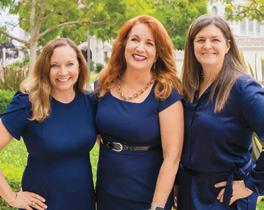
Rider also applauds the contributions made by Shari Baurle Green, who for the past 15 years has managed alumni relations for the law school. Responsible for public and community rela tions with more than 16,000 alumni throughout the country as well as overseas, Green coordinates marketing campaigns and programming—including 60-plus annual alumni events. “I am always eager to meet the evolving needs of alumni,” Green says of her central role in Alumni Relations, ”and I’m motivated to engage with them in meaningful ways.”
Together, the team is always on the front lines of community building. “What is most satisfying for me is working with people who have a really generous heart and such faith in our institu tion,” Rider said. “To me, you can’t hope for anything better than to work with people who are committed to having an impact.”
In 2022, the USD Transactional Law Team won Best Overall at the Duke University Transactional Law Competition. The team con sisted of 3L Trevor Dorne; 3L Ulrick Matsunaga; Sina Govashiri, ’22 (JD); and 1L Samantha Casey, and was coached by Professor and former Dean Stephen Ferruolo.
The team was also awarded First Place: Best Draft and Second Place: Best Negotiation. The win at Duke fol lowed up a win at the Wayne State Jaffe Transactional Law Competition.
“The win in the Duke competition is a testament to the hard work of the out standing team members,” said Professor Ferruolo. “This win adds to the growing
legacy of the USD Law Transactional Law Team. USD is recognized as one of the top law schools in the country in transactional law competitions, which contributes to the high ranking we have achieved for practical training as well as to the success our graduates have had in landing prestigious busi ness law positions in top law firms.”
USD School of Law is dedicated to assisting former service members with free legal aid, expanded educational opportunities and comprehensive programs
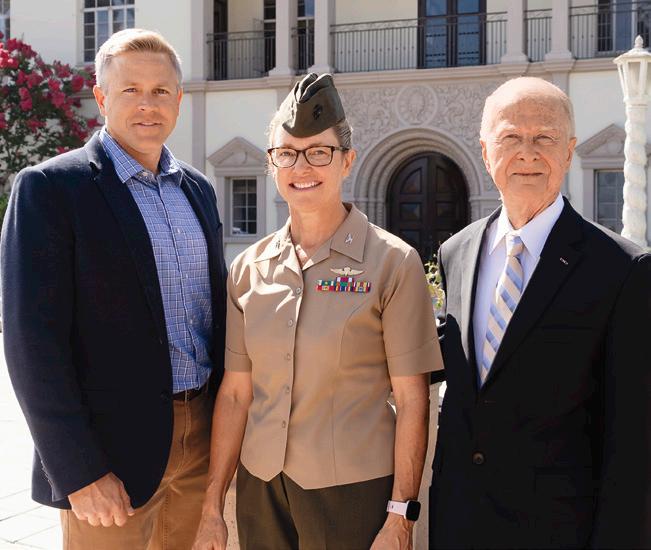
When Teresa Hogan was 17 years old, she joined the U.S. Navy. She worked to become a medical laboratory technician, com pleting her schooling and training with high marks. She says she planned to be in the military for many years.
“I wanted to serve my country,” Hogan said.
Unfortunately, in 1980, before she had turned 20, she confided in another service member that she was confused about her sexuality. That person told Hogan she must report herself or be reported, so she went to speak with a staff psychologist. The psychologist reported the conversation to Hogan’s commanding officer, and she was discharged from the service for what was then considered misconduct.
Despite her record of service and her honorable discharge, the document summarizing her service, called a DD 214, stated she was separated from the Navy for “Misconduct—Homosexual Acts.”
This statement on her record would follow her everywhere she went, especially to job interviews.
“Any time I applied for a job where I needed to show proof of my military service, I felt embarrassed and didn’t want to have to explain to a potential employer the circumstances of my discharge,” Hogan said. “It was horrible that my sexual orientation was labeled as ‘misconduct’ in the eyes of the military.”
Fortunately for Hogan, she learned at a local veterans organization about the USD School of Law’s Veterans Legal Clinic. Contacting the clinic, she learned that she had the right to have personal information taken off of her separation document and, with the clinic’s help, had the information removed.
“I feel like a weight has been lifted off my shoulders and that I can be proud of my service to this country,” she said. “I want other veterans like me to feel the same cloud [can be] removed from their lives.”
Much of the work on Hogan’s case was done by Kelsey Gagnon, also a Navy veteran, who works as the Janet Marie Kane Memorial fellow in the Veterans Legal Clinic.
“My client can’t get the time back that she wanted to serve but wasn’t allowed to,” said Gagnon. “But at least she can finally be proud of her service, which should never have been defined by personal information that had no relevance to the quality and character of her service.”
Supervising Gagnon on the case was the managing attorney of the clinic, Robert Muth, a veteran himself, who founded the Veterans Legal Clinic in 2012 and is the faculty director of all 11 of the School of Law’s award-winning legal clinics.
“This veteran’s service was honorable,” Muth said in a recent interview. “It just wasn’t recognized as such at the time.”
The USD Veterans Legal Clinic not only helps with DD 214 and military dis charge characterizations, it also focuses on assisting veterans who have been defrauded of their GI Bill benefits by forprofit educational institutions and helps veterans receive deserved benefits.
Some of the veterans served by the clinic are experiencing significant mental health issues and homelessness. Some have post-traumatic stress disorder, sometimes because of sexual trauma they suffered while in the military.
“Some of the people are in a really dark place,” Muth said, “and we can help them to get mental health care and medical care. Some who are literally living on the street can get lifesaving funds for medical care and assistance to get them back on their feet.”
USD is located in a city with a consider able military presence. California is home to more veterans and members of the military than any other state, with 250,000 veterans living in San Diego County alone. The city hosts the world’s largest naval fleet, multiple Marine Corps bases and a U.S. Coast Guard station.
USD School of Law, and the university in general, welcomes and accommodates veterans and active-duty members of the military not only through the renowned Veterans Legal Clinic but also by making educational funding available and offering a wide range of support.
Starting in 2021, USD School of Law committed to being a 100 percent Yellow Ribbon school, meaning that in a partner ship agreement with the U.S. Department of Veterans Affairs (VA), all tuition and
required fees not covered by an eligible veteran’s GI Bill benefits would be split between the School of Law and the VA.
“This was the first time that not a dime of tuition or required fees came out of the pocket of an eligible veteran,” said Stephanie Kiesel, ’11 (JD), assistant dean of finance and administration for the School of Law, adding that veterans are also provided a housing allowance of approximately $3,000 per month from the VA when in school. “This truly allows vets to be full-time students.”
Kiesel, who once ran a nonprofit organization for veterans and transition ing members of the military, is an official military advocate at USD School of Law. She assists veterans and military-connected students throughout their academic journey.
“I come alongside whenever they need me, to help them maneuver their educational benefits and their law school experience so they know somebody else is in their corner,” Kiesel said.
Kasey Helms is a second-year law student at USD. She served eight years in the Navy as an intelligence specialist and was deployed to the Middle East several times. After her time in the Navy, she moved to San Diego to work as an intelligence analyst for local law enforcement.
Wanting to grow in her career, she applied to law school, choosing USD because of the respect it held among attorneys she had met while working in law enforcement.
Initially, she considered attending law school part time so she could continue to work, but she knew that work would overshadow her academic experience.
“I knew I would sacrifice studying for work obligations and rationally could not accept paying to go to school when I knew it would be my second priority,” Helms said, adding that being offered 100 percent Yellow Ribbon funding cleared her way toward earning her law degree. “I knew that it meant I could afford to go to school full time and keep my budget balanced. I would not have been brave enough to quit my job and go to law school full time without it.”
Helms says she has felt supported at USD School of Law—particularly with handling financial aid questions, register ing for classes and figuring out funding for her summer externship—all issues that never arose during her previous experience with college, which was mostly online. She says she also feels warmly received.
“It feels like our student body is welcom ing to everyone,” Helms said.
Also available to all military-connected students at the university, including students at the School of Law, is the USD Military and Veterans Program, which offers services to veterans, active-duty members of the military, their dependent children and spouses. The center processes the education benefits that allow militaryconnected students to attend the uni versity, and it provides community and exposure to career opportunities. Space to study or just to hang out is available to students, as well as several public comput ers and printers; free coffee; and access to information about scholarships, intern ships and networking events.
According to Kiesel, the USD Military and Veterans Program helps veterans to transition from military to academic life and “endure the rigors of law school.”
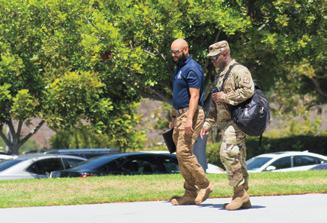
Program director Nelson Chase, ’08 (BA), ’12 (MA), said that accommodating students who are connected to the military is good for the students—and for USD.
“As an anchor institution located near one of the largest concentrations of military personnel in the United States, we are committed to serving the military community’s needs,” Chase said, adding that USD’s Envisioning 2024 strategic plan included establishing a Military-Connected Hub, which evolved into a task force for
creating a Military-Connected Center of Excellence.
“Recognizing the diverse population of service members and their families, we believe that growing our military-con nected student population will make our community more inclusive and diverse,” he said. “Having a veterans center is a best practice recommended by the Department of Veterans Affairs, various higher educa tion groups and student veteran groups like Student Veterans of America.”
A student organization at USD Law that supports veterans and other militaryconnected students is the Military Bar Association, or MilBar. MilBar’s member ship includes many student veterans, but also students interested in becom ing military lawyers, students who are interested in the military in general and those who would like to serve the veteran community. The organization connects students with the Veterans Legal Clinic, as well as the legal community, holding mixers with the San Diego County Military Bar Association. The group also holds
volunteer events to provide resources for homeless vets, such as dental services and legal help.
“MilBar is a great resource for veterans,” said James Spradley, a third-year law stu dent who is on MilBar’s board of directors. “MilBar brings veterans together and has events where established veterans in the community and JAG officers come and recruit students.”
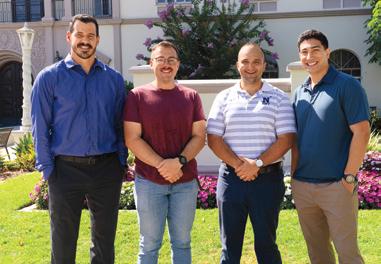
Spradley is a good example of how the assistance that USD provides for veterans both within the university and out in the community can benefit all concerned, not only the recipients of that assistance. When Spradley, a veteran himself who wants to pursue a career as a prosecutor, was researching law schools, he heard about the USD Veterans Legal Clinic.
“I was eager to get involved because I gained so much from my military expe rience and love working with other veterans,” said Spradley, whose work at the clinic has brought him invaluable realworld experience, including conducting a direct examination in front of an adminis trative judge of a veteran who was denied disability benefits. “Veterans deal with a lot of challenges, especially when they transi tion back into civilian life. I believed in the mission of the clinic to help these veterans navigate these complex situations.”
For Gagnon, the clinic fellow who rep resented Teresa Hogan, the Veterans Legal Clinic is a great example of community service.
“The attorneys in this clinic are rock stars,” Gagnon said. “They’re making a huge difference in the community, and there isn’t much they won’t do to help veterans.” ■
“ As an anchor institution located near one of the largest concentrations of military personnel in the United States, we are commit ted to serving the military community’s needs.”
—NELSON CHASE, ’08 (BA), ’12 (MA)From left: 3L James Spradley, 3L Sam Hjerrild, 2L Matteo Macaluso and 1L Anthony Cardon.
“It was the missing puzzle piece of my legal education,” said Sanam Khajenoori, ’22 (JD), of the recent externship she had with Wilson Turner Kosmo, a women-owned law firm in San Diego. “I’d had a lot of other hands-on experiences in school, but this was the most valuable because I knew how much it would help me when I entered practice.”
Khajenoori was one of seven 3L students to enroll in the law school’s inaugural Law Firm Externship program in the fall of 2021. Designed to give students academic credit for externing with a participating law firm, the program offers real-world experience and networking opportunities to help students advance in their careers. And students like Khajenoori—who has since received an offer to join Wilson Turner Kosmo as a post-bar law clerk and, pending bar passage, as a fulltime associate—are discovering just how much of an advantage they gain as a result.
The Law Firm Externship program is part of a new initiative called the USD Promise, an ambitious, multipronged effort to help ensure students’ success. Launched by Dean Robert A. Schapiro shortly after he joined the law school in January 2021, the USD Promise guarantees that every JD student will have the opportunity to gain substantive legal experience; the Promise also extends to recent grads by helping them obtain career-track employment in their first year out of law school. Perhaps most significantly, if the work the students and new alumni find is unpaid, the law school is offering to pay their salaries itself.
From left: Law Firm Externs 3L Jessika Russell, 3L Emma Steer, 3L Sofia Torrez, 3L Roxanna Palizi, 3L Arash Ghahremani, and 3L Tereza Callender.
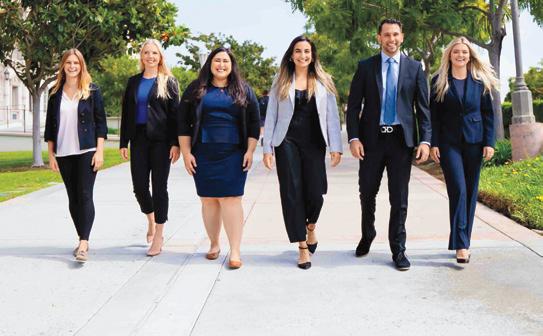
“Our goal is to ensure that going to law school at USD is the first step in what we hope will be a long and fulfilling career in the law,” Dean Schapiro said. “We want to put our students in the best position to launch into flourishing careers.”
The first part of the Promise, Dean Schapiro said, is to offer students mean ingful ways to gain practical skills while still in school. Of course, there has always been an emphasis on skills acquisition at USD School of Law—from the Experiential Advocacy Practicum required of 1Ls to the outstanding clinical education pro gram—and the Promise is building on this foundation and taking it to a new level.
Now, in addition to the new Law Firm Externship program, Schapiro said, “we expanded our public interest fellowship program for students who want to work at a nonprofit organization or a government
A bold initiative helps students and recent grads gain meaningful work experience
agency during the summer so they can get practical legal experience.” Students also have increased opportunities during their summer months to work at the USD Legal Clinics and centers.
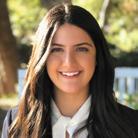
“Where Dean Schapiro really stepped up is that he said to students, if you find an unpaid position with a nonprofit organization or government agency, USD Law will pay you for the hours you work so that you can take the job and be able to pay your bills,” said Stephanie Kiesel, ’11 (JD), assistant dean of finance and administration. “And it has been phenomenal. In the first year since we expanded the program’s constraints, we’ve gone from about 25 stu dents who chose to work for public interest organizations to more than 100.”
The second component of the Promise is to help new graduates find—and thrive in—their first post-graduation jobs. This extra assistance was espe cially important for graduates who were in school during the pandemic and had reduced opportunities to build their resumes due to closures.
“Many recent grads in the Class of 2021 had their summer internships can celed or shortened due to the pandemic,” said Marti Worms, assistant dean of career and professional development, who played a key role in matching indi viduals with work opportunities. “We launched a pilot program in our Legal Clinics for our 2021 graduates who did not have a post-bar position lined up after taking the bar exam. We hired seven students as post-bar fellows and funded their salaries so they would have security and a job while waiting for their bar results in November. And then once they found out they passed the
bar, they will have this great experience to put on their resumes.”
The USD Promise was still evolving during its first year, and as it grew, Dean Schapiro, Kiesel and Worms continued to add new initiatives. To increase opportuni ties for new grads, they placed several of them in full-time positions at USD School of Law’s clinics and centers, hired some to be remote research assistants for faculty members, and placed a dozen grads with boutique law firms as clerks.
“Every time an idea presented itself, the dean’s attitude was, if it helps our students get jobs or get the experience they need to get jobs, let’s try it,” Kiesel said. “To date we have financially supported 21 of our 2021 graduates through all these different pipelines, and it has been such a win-win. Many of them have gone on to amazing job opportunities directly related to the position we helped them secure. From my perspective, it is hands-down the most impactful and fulfilling thing I have done here at the law school so far.”
From left: Hannah Ohman, '22 (JD); Arielli Ferrer, '22 (JD); Alex Ruf, '22 (JD); Rami Dennaoui, '22 (JD); and Dean Robert A. Schapiro at the 2022 School of Law Graduation Dinner.
Khajenoori, the recent grad now at Wilson Turner, is one of many success stories to result from the Promise. “I am so thankful that I got this chance,” she said. “You know the panic you feel as a 3L when you don’t have a job yet? I was so uncomfortable, but when I got this opportunity, it was a huge relief. I am so grateful for that.” ■
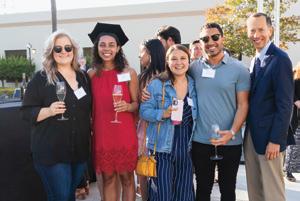
“I’d had a lot of hands-on experience in school, but this was the most valuable because I knew how much it would help me when I entered practice.”
—SANAM KHAJENOORI, ’22 (JD)
Vic Merjanian, ’10 (JD), and Ralph Kalfayan, ’82 (BA), ’85 (JD), ’12 (LLM)
From entertainment lawyers in Los Angeles to entrepreneurs in Orange County, USD School of Law grads are making their mark throughout the region
Ralph Kalfayan and Vic Merjanian draw upon the friendship they forged at USD to make the world a safer place
When Ralph Kalfayan, ’82 (BA), ’85 (JD), ’12 (LLM), met Vic Merjanian, ’10 (JD), in a water law class while completing his LLM, he could not have known that the bond they formed would go on to save lives.
Merjanian’s ability to critically consider and debate the law with some one who had received his JD almost 25 years prior stood out to Kalfayan, prompting him to hire Merjanian as a clerk at his law firm, Krause,
Kalfayan, Benink & Slavens, LLP. Four years later, when the law firm expanded to Merjanian’s hometown of Newport Beach, they took on a new name: Kalfayan & Merjanian LLP.
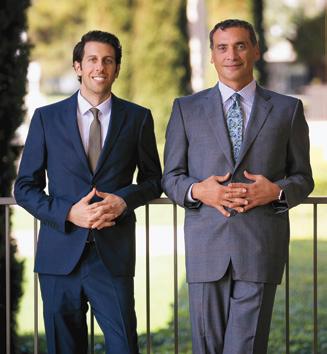
As the success of the law firm grew, the jousting of minds that they had found so engaging in law school only intensified.
Sometimes Kalfayan would pull out a binder full of different colored pens, and the two would cover whiteboards, and windows, strategizing cases. The backand-forth nature of their brainstorming sessions made them extremely effective at identifying problems and coming up with complex solutions.
It was only natural then, that when the two attended a Newport Beach holiday party in 2014, they would leave with an idea for their newest venture: Titan HST. Titan HST is a revolutionary technology used by the NFL, schools and communi ties across the country to keep people connected and informed during natural disasters and public emergencies such as active shooter situations. The technology even saved its first life within the first 20 minutes of its deployment.
Kalfayan and Merjanian say they do not know what their next venture will entail. What they do know is that they will continue to work together to learn, innovate and try to make the world a better place.
Beth Baier, Christine Chrisman and Tiffany Kwong are part of a new generation of women lawyers in the entertainment industry
Christine Chrisman, ’96 (JD), was a teenager when she read an article in the Los Angeles Times about the lack of women in the entertainment industry.
Inspired by the article, she now finds herself as the vice president of busi ness affairs and the legal counsel for the animation team at Walt Disney Animation Studios. The small size of her team means Chrisman wears many hats. Among other roles, she serves as a production lawyer, handles business affairs negotiations, provides general legal guidance, and serves as the point lawyer for Academy Award-winning films such as Frozen and Encanto.
Chrisman is not alone. She, along with Tiffany Kwong, ’15 (JD), and Beth Baier, ’84 (JD), is part of a growing network of USD-graduate women lawyers dominating the Los Angeles entertainment industry.
Baier, the senior entertainment counsel for the Walt Disney Company, ended up in the entertainment industry by chance. She began her legal career as a litigator at O’Melveny & Myers before hearing of a litigator position at Warner Brothers. She applied, and although the position never opened up, she was tapped to work in the home entertainment distribution division. She became the general counsel for Warner Brothers’ home enter tainment distribution group before leaving for Disney in 2013, where she worked with the company’s television distribution group and now heads the subsidiary Movies Anywhere.
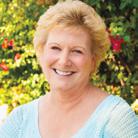
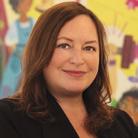
It was around this time that a young Tiffany Kwong reached out. Kwong, who majored in film and media and worked at Disneyland as an undergrad uate, always knew she wanted to work in entertainment. As a law student
with few industry connections, she knew it would be difficult to get there. For Kwong, Baier served as affirmation that there was a place for her in the entertain ment industry. After law school, Kwong immediately began forging her own path, working in business affairs at Hollywood’s United Talent Agency. Her move to Apple TV+’s original content division in 2017, where she serves as a business affairs exec utive, signaled to her that she had made it.
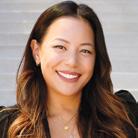
She is also the founder and co-chair of the AsianPacific@Apple Los Angeles Chapter. Kwong is already a force to be reckoned with in entertainment.
Each is working hard to ensure that future generations of women lawyers have better access to the industry.
Chrisman often works with USD Sports and Entertainment Law Society students, teaching, mentoring and workshopping career ideas. Baier meanwhile has taught courses at USD as an adjunct professor and serves as the faculty advisor for the corporate counsel externship program.
She is also on the Law Alumni Association Board of Directors. Kwong has participated as a mentor in USD Law’s mentorship program and has worked hard to cre ate opportunities in the entertainment industry for women and minorities. They know that the insights they have gained in their winding paths to the top could prove invaluable to future generations. ■
“ Mentorship is something that I had often throughout my career. Working with law students is very fulfilling and satisfying. I can share my experiences with them and give them some type of road map if they need it.”
’84 (JD)
M. Margaret McKeown, who has led a distinguished career as a federal judge, is well known at USD School of Law as its jurist in residence. Here, McKeown discusses how maintaining an open mind has helped her balance jurisprudence, academia and her own scholarly pursuits.
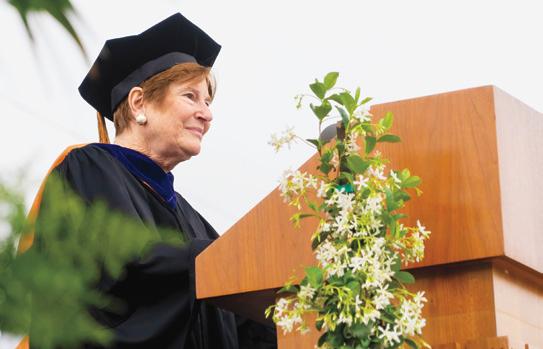
Judge M. Margaret McKeown, USD School of Law’s jurist in residence, was the first female partner at Perkins Coie, starting there in 1975 in Seattle and later opening the firm’s office in Washington, D.C. Known for her expertise in intellectual property law, she has represented clients such as Boeing, Nintendo and Amazon. In 1996, she was nominated to sit on the U.S. Court of Appeals for the Ninth Circuit by President Bill Clinton, was confirmed in 1998 and continues in her role as a federal judge. McKeown was the keynote speaker at the USD School of Law’s 2022 commencement and has recently published a new book, Citizen Justice: The Environmental Legacy of William O. Douglas.
What is the most important aspect of your role as jurist in residence?
The focus of my role is to connect with the students to provide a judicial resource for them as they move through law school. In addition, I try to provide practi cal insights about law school, legal jobs and the legal world in general. Although I do many things, such as judging the moot court, guest lecturing during the year, Extern Bootcamp and participating in seminars, my favorite things are the Brunch with the Bench series that I do with first-year students and teaching in the USD summer program in Paris.
In your 2022 commencement speech, you advised the graduates to “have time and an open mind for the unknown” or, in other words, to allow some serendipity in the shaping of their careers. Was ser endipity also an element in your career?
I sincerely believe that not everything in life can or should be scripted. The future is often unknown, and there are opportunities and avenues that one can never fully anticipate. When I took a chance after law school to move to Seattle—where I had never lived and knew almost no one—it was an adventure that played out in so many positive ways. I joined a firm, Perkins Coie, which it turned out complemented my interests and talents, and it was a fabulous relationship for almost 25 years before I joined the bench. Likewise, when the firm asked me to help open its D.C. office, the chal lenges and realities of such an undertaking were unknown but stretched me in ways I couldn’t imagine. And when I was approached about apply ing for an opening on the Ninth Circuit, it was not an option I had ever imagined. I loved practicing law, but the prospect of being in public service and having the chance to think, write and influence the law was a chance I couldn’t pass up. When I agreed to be considered, I had no idea it would be three and a half years before I was confirmed. That was a bit of serendipity I neither anticipated nor enjoyed. But the end result was well worth it and, as one of my friends on the district court told me, “You’ll never look back.” And he was right.
You also said in your commencement address, “We are a profession, not a business.” Could you expand on that?
To me, the law profession evokes the spirit of service, ethics and dedication to clients. Of course, the business aspect is infused in the reality of private practice, but lawyers should never forget that we are a profession, not just a business.
Why did you decide to write about Justice William O. Douglas, who served on the U.S. Supreme Court from 1939 to 1975?
I am a Wyoming native and one winter I was cross-country skiing in the Grand Teton National Park when I discovered the Murie Ranch, the home stead of two famous conservationists—Olaus and Mardy Murie. I learned they were good friends with Justice Douglas because of the conservation movement. I began researching the topic, and what began as a lark ended up as a book.
What can you tell us about your new book?
Citizen Justice: The Environmental Legacy of William O. Douglas, Public Advocate and Conservation Champion chronicles Douglas’ dual role as the longest-serving Supreme Court justice and his lobbying activities on behalf of the environment. He cajoled presidents, members of Congress, environmental organizations and federal agencies to pre serve wilderness. He also took a number of protest hikes and was instrumental in saving the C&O Canal in Washington, D.C., from being paved over; the Olympic Peninsula from sprouting a highway that would ruin the longest stretch of beach wilderness in the continental U.S.; and preserving the Red River Gorge in Kentucky. He led similar protests around the country and was a vocal advocate for wild places. Although he is well known for his opinions on civil liberties, perhaps he is best known for his famous dissent in Sierra Club v. Morton, which queried whether trees have standing. His political and conservation activities distinguished him as a controversial justice.
Now that you are stepping back as a judge with the U.S. Court of Appeals for the Ninth Circuit, what’s next on your agenda?
I am not really stepping back but tak ing senior status, which will allow me to continue hearing cases as a member of the court. I expect to take a substantial load, but over time, I hope to reduce my load somewhat so I can focus on more teach ing and more writing—perhaps another book, this time about the courts and the digital wave. ■
“The prospect of being in public service and having the chance to think, write and influence the law was a chance I couldn’t pass up.”
New
ax law touches everything,” said USD School of Law Professor Miranda Perry Fleischer of her chosen field, and most tax experts would be quick to agree with her.
However, its vast reach and ever-increasing complexity make tax law a challenge for some students.
For others, though, those things can be an attraction; they view tax law as a set of sophisticated mental puzzles to solve, involving logic and reasoning, statutory interpretation, and social policy considerations. For these students, USD School of Law’s LLM in Taxation program is ideal.
It’s already one of the top-rated graduate tax programs in the country and will only grow in stature and substance with new personnel, added this year.
Fleischer, the program’s most recent director, stepped down in May to
focus more time on her research and writing. Fleischer has an unusual spe cialization: the intersection between tax law and philosophy. She views her work as “a bridge between those two worlds of tax law and philosophy,” involving such topics as wealth and wealth taxes, chari table giving, and universal basic income.
Fleischer will continue to teach in the LLM program and also to organize USD Law’s well-regarded series of lectures on tax issues. The renowned Pugh Lectures on Tax Law & Policy bring a distin guished speaker to the law school each year to discuss current and developing tax law and policy trends. The 2022 Pugh lecturer was Maurice Foley, then chief judge of the U.S. Tax Court.
A separate Tax Law Speaker Series brings outside academics to the law school to expose students to the schol arly side of tax law—a way to bridge theory and practice, Fleischer says.
An unintended but beneficial conse quence of Fleischer’s academic writing is that it appears to have influenced new professor Michelle Layser’s deci sion to join the faculty, as of the fall 2022 semester. Layser, formerly of the University of Illinois College of Law, does cutting-edge research relating to tax incentives for low-income areas and populations. Of Fleischer and her scholarship, Layser said, “She has a really clear method that she brings to structur ing problems, and I cite her, in my own work, as much as I do any other scholar. She’s one of the people that I look to as a model.”
One of the more popular tax course offerings at USD School of Law is the
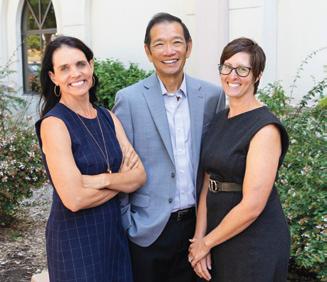
initiatives enhance the breadth and depth of USD Law’s renowned LLM in Taxation program
Tax Planning Lab, a hands-on clinic in which students work with tax lawyers from the San Diego area. Its opportunities for practical experience across multiple tax practice areas, not to mention networking, are legend ary. Since 2016, the Lab has been organized and led by Paul Yong, who is known for his passion for teaching and for enabling his students to hit the ground running after they graduate.
Now Yong has taken on an added role: As of June 2022, he’s the new director of graduate tax programs and professor of practice at USD. His energy, enthusiasm and ambition are obvious. “We want to build on and enhance this very successful program,” he said, “so that we are now and in the future the tax LLM of choice on the West Coast.” Among the initiatives he is already working on are expanding USD School of Law’s footprint in the Pacific Rim and Latin America and reengaging in a sub stantive way with LLM alumni.
USD School of Law also offers LLM programs in other areas of concen tration, including international law and business and corporate law. All of those now come under the charge of another new USD School of Law hire, Karen Sigmond, ’96 (JD), who was named in January 2022 as senior director of graduate, international and certificate programs. Sigmond sees,
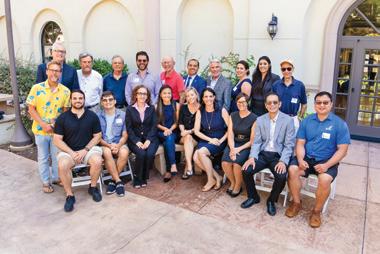
in all of them, “a huge opportunity for growth.”
The quality of the USD Law LLM in Taxation program, and the value of the degree, is proved by the quality of its graduates and their success as prac titioners. There are, worldwide, over 1,000 alumni practicing in nearly every conceivable type of tax-related endeavor. One who stayed close to home is Sara Pike, ’19 (JD, LLM), who worked before law school for 13 years in Spain in various jobs, including as an adventure tour guide.
After she graduated with her JD, Pike jumped at the opportunity to use the USD “one-semester advantage.” (The LLM is a one-year program, but if students take a requisite number of tax courses while obtaining a JD from USD School of Law, they can graduate with an LLM program in one semester—a half-year.) This had several benefits for her, Pike said, not the least of which was the savings in tuition cost and only a few months delay in starting her career.
Pike is now an associate in the San Diego office of Withers Bergman. “The more you know, the more of an asset you will be to the firm,” she said. “Having the LLM has been a huge plus for me.” ■
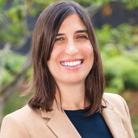
“The more you know, the more of an asset you will be to the firm. Having the LLM has been a huge plus for me.”
—SARA PIKE, ’19 (JD, LLM)Engaged students, faculty and administrators make the LLM in Taxation an effective and influential program.
The USD School of Law faculty is committed to advancing the study and practice of law. In these pages, learn about our professors’ activities, achievements and scholarship.
WITH A NEW BOOK—AND A NEWLY LAUNCHED CENTER AT THE LAW SCHOOL— PROFESSOR ORLY LOBEL IS RAISING TIMELY QUESTIONS ABOUT EQUALITY, EMPLOYMENT AND TECHNOLOGY

The modern labor market never stands still—and neither does one of the leading experts on employment law, USD Warren Distinguished Professor of Law Orly Lobel. Lobel leads the law school’s newly opened Center for Employment and Labor Policy (CELP) and has a new book—her third aimed at a general audi ence—titled The Equality Machine: Harnessing Digital Technology for a Brighter, More Inclusive Future, which was recently published by PublicAffairs. Harvard Law Professor Lawrence Lessig says about the book, “In this beautifully written and wide-ranging work, Orly Lobel shows how a smart architecting of our technical environment can make us better humans, in a healthier environment. This is critical thinking and insight when—and where—we need it most.” Jonah Berger, a Wharton professor and New York Times bestselling author, calls the book “a must-read” and notes, “as always, Lobel gives us a crystal-clear, front-row seat to our evolving digital realities.”
“Employment law, as I teach it and research it, is a field that intersects with all other policy fields,” said Lobel, listing a few: equality and inclusion; social welfare; tax policy; education and re-skilling; technology, automation and innovation; global compe tition; corporate law; family law; and immigration law.
“Questions about vaccine policies were about employment law as well—how the government can ensure the safety of workers,” she noted. “Can the Occupational Safety and Health Administration mandate vaccines?
“The list goes on,” Lobel said. “Every important issue is really an important work law issue.”
That’s where the new center comes in. It will be linked with many existing programs at the law school and serve as an umbrella for many activities—from traditional classes to clinical programs like
the Workers’ Rights Clinic, from initiatives to prepare students for jobs in employment law to efforts to grow the San Diego economy. This fall, CELP will host the annual meeting of the national Labor Law Group.
The center will host many events, Lobel said, including some examining timely issues in labor law, from the gig economy to biotechnology.
Her new book lands sharply on that edge.
“It’s the book that will move the conversation forward from what has been a bit of a stalemate,” she said. “The conversation has been: Is technology doing harm? Is technology good or bad?”
Lobel wants to move from dystopian stories about automation and invasion of privacy. “It’s up to us to direct technology in a way that’s positive,” she said. “Whether or not we’re going to use tech nology—that train has left the station. We’re already in the reality of big data. We’re all users of digital technology.
“Think about all the positive opportunities, especially from the perspective of inclusion and equality, to design and use technology in ways that are more inclusive,” Lobel said. Algorithmic screening, to cite one example, could make job screening “less biased than human decision-making, which is fraught with a lot of biases.”
While Lobel—who has many awards for her scholarship, includ ing the Thorsnes Prize for Outstanding Legal Scholarship and the Irving Oberman Memorial Award, and is one of the most cited employment law scholars in the nation—publishes frequently in law journals, her books are accessible to anyone. Her first, Talent Wants to Be Free: Why We Should Learn to Love Leaks, Raids, and Free Riding (Yale University Press, 2013), challenged conventional wisdom on locking up employees. Her second, You Don’t Own Me: The Court Battles That Exposed Barbie’s Dark Side (Norton, 2017), gave such a compelling view of intellectual property that film rights have been optioned. She has also co-authored three employment law textbooks and her work has been influential on federal and state level policy.
“ The Equality Machine celebrates stories of people at the fron tier, primarily women and people of color, who have skin in the game in this vast new world of artificial intelligence shaping every aspect of our lives,” Lobel said. “The idea is that, instead of just looking from the outside and pointing to a failure, I’m showing that we have to figure out the comparative advantages. What are the opportunities? How can we mitigate the risks? How can we get away from the binary way we’ve been locked in?”
→ USD School of Law Associate Dean of Faculty and Herzog Research Professor of Law Mila Sohoni was appointed a public member of the Administrative Conference of the United States (ACUS) in 2022.
ACUS is an independent federal agency that works to improve the administrative process through consensus-driven applied research and providing nonpartisan expert advice and recommendations for federal agency problems. ACUS membership is composed of senior federal officials, academics and experts from the pri vate sector, including up to 40 public members appointed for a two-year term. Public members are members of the practicing bar, scholars in the field of administrative law or government, or others specially informed with respect to federal admin istrative procedure.

→ Professor of Law Laurence Claus was elected to The American Law Institute (ALI) in 2022.
ALI is the leading independent organiza tion in the U.S. producing scholarly work to clarify, modernize and otherwise improve the law. Claus is the seventh School of Law professor to be elected to the Institute.
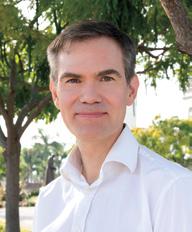
Professor Claus said, “For generations, the ALI has contributed invaluably to our law’s coherence and dynamism. I am grateful for this opportunity to participate in its future endeavors.”
Each year, USD School of Law names two recipients of the Thorsnes Prize. In 2022, they were Warren Distinguished Professor of Law Roy L. Brooks and Professor of Legal Writing Gail Greene.
The Thorsnes Prize for Outstanding Legal Scholarship recognizes professors for their significant scholarly works. Brooks received the award for his book Diversity Judgments: Democratizing Judicial Legitimacy, published by Cambridge University Press. The award also recognizes Brooks’ extensive scholarship on civil rights theory and redress and reparations theory.
The Thorsnes Prize for Excellence in Teaching, awarded to Gail Greene, recognizes a faculty member for extraordinary effectiveness in assisting students with mastering legal subject matter and thinking deeply about legal issues as well as significantly improving their analyti cal, communication and problem-solving skills. The award is voted on by upper-division law students.
In 2022, five law professors were selected by the university and the School of Law to receive prominent honors and professorships:
Warren Distinguished Professor Orly Lobel was named a University Professor. It is the highest academic honor bestowed university-wide at USD and recognizes outstanding scholarly achievements in teaching and research supporting the mission and goals of the university.
Associate Dean of Faculty and Professor Mila Sohoni received the Herzog Research Professorship, a permanent designation that acknowl edges scholars who have established records of enduring research accomplishments.
Professor Ted Sichelman was named the 2022-2023 Herzog Endowed Scholar. The award recognizes meritorious teaching or schol arly productivity and provides funds for professional development or for increased time for research for one year to a law faculty member. It is the second time Sichelman has received this award.
Professor Michael Ramsey was awarded the Class of 1975 Endowed Professorship in recognition of his meritorious teaching, leadership and academic accomplishments. The professorship was established by the Class of 1975 as its 25-year reunion gift to the law school.
Professor and Faculty Director of the Legal Clinics Robert Muth was awarded the 2022-2023 Don Weckstein Professorship in Professional Responsibility. The annual endowment was created to establish and sustain a rotating or permanent professorship in the fields of profes sional responsibility, labor law or alternative dispute resolution.
The Padres gained a fan this summer, and the USD School of Law added another prestigious tax scholar to its deep bench of academic superstars.
Professor Michelle D. Layser, a leading tax law scholar with a focus on the intersection of tax, affordable housing and community development law, started as a USD tax law faculty member this fall.

A self-described tax geek, Layser joined USD School of Law after spending four years as an assistant professor at the University of Illinois College of Law, where she taught courses on partnership taxation, state and local taxation, business taxation, and affordable housing and commu nity development law. Prior to that, Layser taught at the Georgetown University Law Center, where she served as a law research fellow and taught a seminar course on taxation and social justice.
Passionate about her chosen field, Layser says she is end lessly fascinated by the complexities of tax law. “If you’re at
a party and tell people you’re a tax lawyer or a tax law profes sor, it’s not the greatest conversation starter,” she said. “But that’s because most people don’t know or can’t conceive of how interesting it is.”
USD’s renowned LLM in Taxation is one of the many things that appealed to Layser about USD, as is the work of Miranda Perry Fleischer, also a fellow Illinois College of Law profes sor and graduate of New York University’s Master of Laws in Taxation. “The USD LLM is a huge draw in bringing in stu dents who are serious about tax law and policy,” said Layser, “and I look to Miranda Perry Fleischer as a model.”
Michelle D. LayserWidely known for her research that includes the use of tax expenditures to deliver public good and the effects of these expenditures on economic and social inequality, Layser has had her work published in the Tax Law Review, the UC Irvine Law Review, the Wisconsin Law Review and the Indiana Law Journal, among other journals. Her most recent research, which explores how states can overcome constitutional bar riers to place-based tax incentive reform, is forthcoming in the University of Pennsylvania Law Revie w. In addition to her scholarly publications, Layser has also written various articles for the Illinois Institute of Government and Public Affairs, Law360, The Conversation, the TaxProf Blog, and Slate.
Prior to her teaching career, she worked as an associate at Latham & Watkins LLP. She then worked for the Bloomberg Bureau of National Affairs as a legal editor and a managing editor before focusing on research and teaching full time.
Layser received her JD from the University of Southern California Gould School of Law, where she graduated Order of the Coif. While working toward her JD, Professor Layser served on the board of the Southern California Law Review
“I am excited to be joining USD Law’s faculty of engaged scholars,” she said. “I look forward to being inspired by them to do even better work.”
Dov Fox’s trailblazing scholarship resonates after the fall of Roe
→ When the eight-episode Audible Original “Donor 9623: The Greatest Hoax in Reproductive History” was released in the fall of 2020, Professor Dov Fox, USD School of Law’s director of the Center for Health Law Policy and Bioethics, became an instant celebrity. After becoming the No. 1 Audible podcast for 2020, the series was submitted for a Pulitzer Prize in investigative journalism and featured in The Atlantic magazine and on Dax Shepard’s Armchair Experts. A sequel to the Audible Original podcast is in production and due out this fall.
“I never imagined the series would take off like it did,” Fox said. “I had studied hundreds of cases of reproduction gone awry: bungled birth control, embryo mix-ups and freezer meltdowns. This was the one case I couldn’t stop thinking about because it blew the lid off a multibilliondollar fertility industry.” He believes the story of Donor 9623 resonated with so many people because, as he put it: “It’s hard to tell your life story without knowing how it begins.”
What surprised Fox the most was how courts and law makers took notice of the series. Since its release, Fox has been cited in cases at home and abroad, testified before state legislatures, and helped to draft a Colorado law that is the first in the nation to give donor-conceived individuals the right to learn their donor’s identity and access that per son’s medical history. It also caps the number of families that can use each donor.
In 2019, Oxford University Press published Fox’s book Birth Rights and Wrongs: How Medicine and Technology Are Remaking Reproduction and the Law. It examines ques tions he began exploring in his days as a Rhodes Scholar at Oxford University, where he received his doctorate in political theory and served as a lecturer in politics and phi losophy. After that, he graduated from Yale Law School on a Paul and Daisy Soros Fellowship for New Americans.
Since then, Fox has written scores of academic articles on topics covering translational medicine, artificial intelli gence and public health policy. On July 17, 2022, The New

“
America’s culture wars leave many people convinced that conscience has come to represent little more than a card that defeated camps play when they have nothing else to lose.” —DOV FOX
Dov Fox
York Times published his op-ed “What Will Happen if Doctors Defy the Law to Provide Abortions?”
responding to the U.S. Supreme Court’s landmark decision. “Since Dobbs v. Jackson Women’s Health Organization overruled Roe, many clinicians around the country will be risking their careers and freedom if they provide abortion care,” Fox wrote. “Conscientious providers honor patients’ wishes, while consci entious refusers override them. Yet all too often, only the consciences of refusers count in the eyes of the law.
“America’s culture wars leave many people convinced that conscience has come to represent little more than a card that defeated camps play when they have nothing else to lose,” he added. “But it can be more than that. States vigorously safeguard the consciences of refusers. Congress and the courts ought to protect the consciences of providers, too. It has been over a century since judges flexed their common-law author ity to introduce any major category of mitigation. Dobbs gives reason to recover that muscle memory and rec ognize a limited defense of medical disobedience.”
The op-ed is an abridged version of a longer article that will be pub lished by the Harvard Law Review. The relevance and importance of Fox’s research will only grow as this field of law expands in the wake of Dobbs.
“The Supreme Court’s decision is poised to transform the relation ship between states and citizens and between doctors and patients,” he said.
A Principled Constitution? Four Skeptical Views

Is the U.S. Constitution the embodiment of certain principles? Steven D. Smith, Larry Alexander, James Allan and Maimon Schwarzschild—the writers of A Principled Constitution? Four Skeptical Views (Lexington Books, 2022)—for a variety of reasons and with somewhat differ ent emphases, believe the answer is no. While those who authored the Constitution no doubt believed in certain principles such as liberty and equality, the authors argue that the constitution they wrote only reflected those prin ciples insofar as they supported the construction of a new government.
Diversity Judgments: Democratizing Judicial Legitimacy

In Diversity Judgments: Democratizing Judicial Legitimacy (Cambridge University Press, 2022), Warren Distinguished Professor of Law Roy L. Brooks argues that the diminishing legitimacy of the U.S. Supreme Court is driven by a process of decision-making that is antiquated and out of sync with society. Brooks demonstrates how the court can modern ize and democratize its deliberative process, to be more inclusive of the values and life experiences of Americans who are not straight white males.
The Equality Machine: Harnessing Digital Technology for a Brighter, More Inclusive Future
Much has been written about the challenges technol ogy presents to equality and democracy. But, says Warren Distinguished Professor of Law Orly Lobel, we can either criticize big data and automation or steer it to do better. Lobel, who is also the director of the new Center for Employment and Labor Policy, makes a com pelling argument in The Equality Machine: Harnessing Digital Technology for a Brighter, More Inclusive Future (PublicAffairs, 2022) that while we cannot stop technological develop ment, we can direct its course according to our most fundamental values.

Class Action compiles news about alumni from independent submissions and media resources. Submit your news at law.sandiego.edu/keepintouch, or email your update and photo (.jpg or .tif format, 300 dpi) to lawpub@sandiego.edu
Sidney Glick was recognized for 50 years of service to the Ohio State Bar Association.
Hon. Frederic Link retired after 41 years on the bench in San Diego Superior Court.
Steven Cloud made a dona tion of $1,000 to the law library.
Alan K. Brubaker was named Defense Lawyer of the Year by the San Diego Defense Lawyers.
Jose Razo was reappointed by Gov. Gavin Newsom to the California Workers’ Compensation Appeals Board, where he has served since 2015.
Roland Colton published a new book: Baseball Immortal: The Second Coming of Ty Cobb. Fred Schenk was inducted by Lawdragon into the 2022 Hall of Fame.
Hon. Larry A. Burns received the Outstanding Jurist award from the San Diego County Bar Association.
James D. Crosby received the Outstanding Attorney award from the San Diego County Bar Association.
1989
Benjamin C. Bunn was elected to the USD School of Law Board of Visitors’ Steering Committee. 1990
Dale Giali joined King & Spalding LLP in Los Angeles as a partner.
Walter H. Kubelun has been appointed to the Riverside County Superior Court as a judge. Since 2007, Kubelun has held the position of com missioner at the Riverside County Superior Court.
Michael Smyth assumed the role of presiding judge on the San Diego Superior Court.
Lorna A. Alksne retired from her role as presiding judge on the San Diego Superior Court.
Patrick Martin was honored by the Estate Attorneys Association as an outstand ing fellow and recently joined Chamberlain & Hrdlicka in the firm’s San Antonio office.
Larry Williams was named University of San Francisco’s new director of athletics.
Hon. Linda Marie Bell was recognized by the National Council of Juvenile and Family Court Judges as the 2022 Impact of the Year Award recipient at the Annual Justice Innovation Awards.
Susan Cola was appointed interim Santa Monica city attorney.
Marie Burke Kenny was named San Diego Business Journal’s 2022 Woman of Influence: 50 Over 50 Honoree.
Derek Aberle was appointed to the board of directors of LeddarTech.
Matthew C. Dolan was named university general counsel of the Catholic University of America in Washington, D.C.
Marty Lorenzo was appointed general counsel at ViaCyte.
Timothy Scott was named to the University of San Diego Board of Trustees.
Mark Aldrich was appointed general counsel of Might Buildings.
Jonathan J. Asch joined Compass as a San Diego real estate broker.
Mark A. Davis was appointed to serve as a judge on the Los Angeles County Superior Court.
Nadia Keilani was appointed to serve as a judge on the San Diego County Superior Court.
Steve McKenna retired from his position as a senior trial attorney with the Securities and Exchange Commission in March. He is releasing a book at the end of the year, Fair Winds, Following Seas, and a Few Bolters, based on the letters he wrote home while in the Navy’s Aviation Officer Candidate School and serving as an E-2C Hawkeye pilot in the last throes of the Cold War, the first Gulf War, and as an instructor at NAS Miramar.
Noel Vales joined Seyfarth Shaw LLP in Los Angeles as counsel.
Edson K. McClellan was elected to the executive com mittee of Rutan & Tucker, LLP.
On Nov. 17, 2022, USD School of Law held its annual Distinguished Alumni Awards ceremony. Sponsored by the Law Alumni Association Board of Directors, the awards are presented to alumni who have distinguished themselves at an exemplary level and who embody the high ethical standards and commitment to community service that USD Law seeks to instill in its graduates. This year’s event also honored the 10th anniversary of the USD Veterans Legal Clinic as well as Rising Star alumni.
The Distinguished Alumni Awards were given to the Honorable Ana Espana, ’79 (BA), ’82 (JD), and James E. McPherson, ’81 (JD).
Judge Espana is the presiding judge of the Juvenile Division at the San Diego Superior Court. She has been involved with many initiatives to improve the child welfare and juvenile justice systems and has been recognized nationally for her efforts. In his illustrious military career, McPherson, a retired U.S. Navy rear admiral, has served as general coun sel of the U.S. Army, undersecretary of the U.S. Army and acting secre tary of the U.S. Navy.
The 2022 Rising Star Awards were given to Shannon R. Finley, ’13 (JD), a shareholder with Pettit Kohn Ingrassia Lutz & Dolin and presi dent of Lawyers Club of San Diego, and Andy LeGolvan, ’13 (JD), senior vice president at Polygon Technology.
Erin M. Bosman was elected to the USD School of Law Board of Visitors.
Robert Hudock was named an “Elite Boutique Trailblazer” in a feature in the National Law Journal for his employer defense work with fast-grow ing companies in California.
Danielle C. Humphries, ’01 (LLM), was recognized among SD Metro magazine’s 2022 Women of Accomplishment. Humphries is a partner at Hahn Loeser and Parks LLP and is chair of the firm’s San Diego trusts and estates practice group.
Peter L. Chasey was named to the board of directors of Titan Pharmaceuticals, Inc.

Gwendolyn Christeson, owner of The Estate Planning Law Center, PLC, will host an open house on Feb. 1, 2023, to celebrate 20 years of business in Jackson, California.
Teodora D. Purcell (LLM) was elected to the USD Law Alumni Association Board of Directors.

Joshua A. Jessen was named chief legal officer at BetMGM.
Daniela A. Reali was appointed to serve as a judge on the San Diego County Superior Court.

Ronson J. Shamoun, ’98 (BA), ’03 (LLM), received the 2022 Mother Rosalie Clifton Hill Award at Alumni Honors for his campuswide support and involvement at USD.
Andrew M. Sugimoto became the commander of the Eleventh U.S. Coast Guard District. The Eleventh District commander is responsible for the Coast Guard in California, Utah, Nevada and Arizona.
2003

Bridget Gramme was named deputy chief of programs of the State Bar of California.
Courtney L. Baird was named vice chair of Duane Morris commercial and antitrust litigation division.
Chad R. Ensz joined Sheppard Mullin Richter & Hampton LLP as a partner.
Bibi Fell was named Society of Women Trial Lawyers 2022 Woman of the Year.
Alexander M. Calero was appointed to serve as a judge on the San Diego County Superior Court.
Matthew Gruenberg is a partner in the Century City office of DLA Piper LLP, where he practices franchise and distribution law.
Shail P. Shah was added as a shareholder at Greenberg Traurig, LLP’s San Francisco office.
Ana Espana, ’79 (BA), ’82 (JD) James E. McPherson, ’81 (JD) Shannon R. Finley, ’13 (JD)“You can’t just try to get your foot in the door. You need to kick the door down until you get in.”
It is this mantra that has propelled Justin Hollander, ’04 (JD), up the front-office ranks in Major League Baseball. In 2022, Hollander was named executive vice president and general manager of the Seattle Mariners. Few would believe that only recently he was handing out meal vouchers to minor leaguers on the back fields of the Los Angeles Angels spring training complex in Tempe, Arizona, after leaving a six-figure job at an insurance litigation firm.
Hollander, an Ohio native, moved to San Diego in 2001 to attend USD School of Law after completing his undergraduate work at Ohio State University. He was very interested in the law and took a particular
interest in studying labor law. But he never forgot about his dream to one day work in a baseball front office, a desire that intensified during his time in law school. The key was figuring out how to get into the industry.
In 2004, the year he would graduate from law school, Hollander made the short drive to the MLB Winter Meetings in Anaheim. At the Winter Meetings, MLB executives, agents and reporters gather to negoti ate trades, sign players and prepare for the upcoming season. Hollander was there to hand out his resume to anyone and everyone. He was there to kick down doors.
“At that point, I would have taken any job in base ball,” said Hollander. “Literally anything.”
Yet no one would bite. When Hollander graduated from law school that spring, he took a job at a local insurance litigation firm. At night, he worked in the press box at Petco Park, the home stadium of the San Diego Padres, scoring the games for MLB Advanced Media. In his free time, he applied to every front-office job he could find.
 Justin Hollander, ’04 (JD), was recently named to the top leadership of the Seattle Mariners
Justin Hollander, ’04 (JD), was recently named to the top leadership of the Seattle Mariners
“It’s a very humbling experience to try to get a job in sports,” remembered Hollander. “I had what seemed like a thousand rejection letters. But a rejection response was better than no response. It meant they at least knew I was there.”
It was nearly four years into his career as a lawyer when Hollander got a call from the Los Angeles Angels of Anaheim offering him a job as an assistant in player development and scouting. The job with the Angels represented a sizable pay cut, but Hollander jumped at the opportunity to pursue his dream.
“Any time you have the chance to say, ‘I get to have a dream job,’ you have to take your shot,” said Hollander. “If it doesn’t work out, at least you can say you took the shot. You can always figure out [everything else] later.”
While Hollander may have started by handing out meal vouchers to minor league players in spring training, he soon found himself rising quickly through the frontoffice ranks. After eight years with the Angels working in various front-office capacities, Hollander was promoted to the Angels’ director of player personnel, meaning he ran point on all player acquisition processes.
In 2016, Hollander took a job with the Seattle Mariners as their director of baseball operations. He was promoted to assistant general manager in 2018, then promoted again to vice president of baseball operations for the Mariners in 2020. After the Seattle Mariners snapped their historic playoff drought in 2022, Hollander was once again promoted, this time to executive vice president and general manager. The general manager is generally considered the crowning achievement for front-office personnel. It’s the position Hollander dreamt about amid his stacks of rejection letters.
Still, Hollander says the best part is having been able to bring playoff baseball back to Seattle after the franchise’s 20-year playoff drought. “The coolest thing for all of us that work here is when we win a game, you can hear the ‘Let’s go Mariners’ chant echoing through the concourse,” he said. “Everyone wants it so badly. You can’t help but feel proud. It’s why you have this job. It’s a special feeling.”
2006
Kristin Rizzo was named chair of the city of San Diego’s Human Relations Commission and joined the State of California’s Civil Rights Department Dispute Resolution Division. 2007
Adriana R. Ochoa was appointed general counsel of Metro Wastewater JPA.
Adam Diament is celebrating his five-year anniversary of opening his own intellectual property law firm, Diament Patent Law, P.C.
Andrew Haden was named first assistant U.S. attorney for the Southern District of California.
Mohamed Lamin Tarawalley (LLM) was appointed attorney general and minister of jus tice for Sierra Leone.
Frank Chang joined Goldberg Segalla in Los Angeles as a partner.
Ashley Hirano joined Illumina as a senior employment attorney.
Laszlo Ladi (JD/LLM) was named corporate counsel of Unison in San Francisco.
Annalisa Zulueta joined Lewis Brisbois Bisgaard & Smith in San Francisco as an associate.
2010
Detective Joseph W. Berriman is assigned to the Violent Crimes Unit on a federal counter-narcotics task force (HIDTA) and is an investiga tor for the Regional Critical Incident Team. He lectures at the Public Safety and Emergency Services Institute at Pima Community College.
Austin Evans was named chair of San Diego’s Small Business Advisory Board.
Ric T. Fukushima joined Herbalife Nutrition as director/privacy counsel.
Elisha Harp (LLM) joined Hahn Loeser & Parks LLP as an associate.
Bridget I. Harrison joined Bober, Peterson & Koby, LLP as a partner.
Chris Hayes was named head of government relations at Celo, a blockchain/cryptocur rency platform based in San Francisco.
Dylan Aste was named president of the Federal Bar Association, San Diego Chapter.
Jamie L. Altman Buggy joined Harvest LLP as partner and general counsel.
Lisa M. Anderson (LLM) celebrated a year of owner ship of the spa La Di Da Sugaring, LLC.
Heather Claus is a senior health care attorney with Seyfarth Shaw.
Ben Coughlan was installed as the president of Consumer Attorneys of San Diego at the 63rd Annual CASD Awards and Installation Celebration.
Kirsten Gallacher was elected partner at Wilson Turner Kosmo.
Jamie Ritterbeck joined Gomez Trial Attorneys as a trial lawyer.
2013
Promode Chiruvolu was named a 2022 Technology Rising Star by Law360.
Shannon R. Finley was installed as president of Lawyers Club.
2014
Bardia Moayedi was among San Diego Business Journal ‘s
2022 40 Next Top Business Leaders Under 40 and SD Metro‘s 2022 Top Attorneys.
Matthew Abbot joined Procopio, Cory, Hargreaves & Savitch LLP as an associate.
Maryam Rastegar joined Just in Time for Foster Youth Board of Directors.
Kelly C. Smith joined Allen Matkins in Orange County as an associate.
2016
Tony Carvalho was named a Northern California Super Lawyers Rising Star.
Zachary G. Damian gradu ated from the Judge Advocate Basic Course at the University of Virginia Charlottesville and was placed on the Commandant’s List after finishing sixth out of 117 graduates.
Julianna H. Kat was elected to the USD School of Law Alumni Association Board of Directors.
Ally F. Keegan was elected to the Lawyers Club’s Board of Directors.
2017
Vivian A. Adame was elected to the Lawyers Club’s Board of Directors.
Ryan Bennett (MSLS) was promoted to detective in addition to collateral duties as a field training officer, fire arms instructor and human trafficking investigations offi cer with the San Diego Harbor Police Department.
Julie Houth (LLM) began serv ing as treasurer of the New York State Bar Association’s
Young Lawyers Section. She is also on the board of directors for the Pan Asian Lawyers of San Diego.
Ryan S. Kirby was named general counsel of Insurance Office of America.
David S. Casey III was elected to the USD Law Alumni Association Board of Directors.
Kevin R. Davis is one of six attorneys added by Polsinelli to their health care litigation and IP groups.
Christopher E. Hines joined Lorber, Greenfield & Polito, LLP as an associate.
Berenika D. Palys joined Munck Wilson Mandala LLP as an associate.
Nicole M. Paschoal joined Withersworldwide as an associate.
Marie F. Shimada was appointed reserve manager of Ebey’s Landing National Historical Reserve.
2019 Wendy Brown completed a nine-month deployment to Kuwait and Iraq with the 40th Combat Aviation Brigade as the brigade’s ground trans portation officer.
Hyeon S. Kim joined Snell & Wilmer as an associate.
Ian King serves as the managing partner of a crisis management firm in Los Angeles.
Brittany M. Wunderlich joined Duane Morris LLP as an associate.
2020
Julieann Alvarado joined Zakay Law Group as an associate.
Miguel A. Alvarez joined Jones Day as an associate.
Ricardo Azcarraga joined Nelson Mullins Riley & Scarborough as an attorney.
Ashley L. Barton joined Duane Morris LLP as an associate.
Diane Byun was elected to the USD School of Law Alumni Association Board of Directors.
Kimberly M. Keen joined Higgs Fletcher & Mack LLP as an associate.
Carola Murguia joined Dentons as an associate.
Michelle L. Propst joined Pettit Kohn Ingrassia Lutz & Dolin PC as an associate.
Carson Williams joined Goodwin Procter in Los Angeles as an associate.
2021
Rayne Brown joined Pettit Kohn Ingrassia Lutz & Dolin PC as an associate.
Kevin J. Oberlies joined Blanchard Krasner and French as an associate.
Jessica C. O’Malley joined Pettit Kohn Ingrassia Lutz & Dolin PC as an associate.
Kimberly A. Vallot joined Gibson Dunn & Crutcher LLP in Orange County as an associate.
Dylan D. Wilson joined Fennemore Craig PC in Phoenix as an associate.
Elmira Yousufi joined the Law Office of David P. Shapiro as an associate.
Eden Zakay joined Wood Smith Henning & Berman LLP in North Carolina as an associate.
William (Bill) Lawrence, a USD School of Law professor, passed away earlier this year at the age of 78.

An expert in comparative law, international law and commercial transactions, Lawrence joined the faculty in 1993. He was known as an unfail ingly cooperative colleague and passionate professor. “He had very high standards for students,” said Professor of Law and former Vice Dean Mary Jo Wiggins. “He wanted to make sure that [students] left his courses with an extremely strong understanding of the rigor and exactness required to practice in commercial law.”
After completing his undergraduate degree at the University of Oregon, Lawrence joined the Peace Corps and was stationed in Chile. Upon completion of his work with the Peace Corps, he returned to the University of Oregon to complete his Juris Doctor. Lawrence then moved to Washington, D.C., where he worked for the U.S. Department of Transportation in the Honors Attorney Program. Later, while teaching at the University of Kansas School of Law, Lawrence was recruited by his close friend, Professor Emeritus Jack Minan, to USD School of Law, where he would spend the rest of his career.
“Professor Lawrence was held in the highest respect by his colleagues as well as his students,” said Vice Dean and Professor of Law Margaret Dalton. “He didn’t know how to say no when we needed his participation. He will be sorely missed.”
John R. Heisner passed away on June 21, 2022, at the age of 75.
Anthony M. Wetherbee passed away. 1974
Timothy H. Treadwell, ‘70 (BS), passed away on Dec. 31, 2021, at the age of 74.
Nancy Dooley-Englund passed away on Feb. 7, 2022, at the age of 77.
Mary Franklin, ’72 (BA), passed away on July 28, 2022.
Andrew D. Rose, ’72 (BA), passed away.
Robert C. Wood passed away on April 16, 2022, at the age of 73.
William R. Stark passed away.
John A. Berol passed away on March 24, 2022, at the age of 73.
Lauren A. Seder Antonakos passed away on Feb. 14, 2022, at the age of 64.
Mark A. Schwartz passed away on Jan. 7, 2022, at the age of 61.
John L. Vanderslice passed away. 1987
Joyce L. Baron passed away on Jan. 31, 2022, at the age of 67. 1988
Harvey Richelson (LLM) passed away on April 2, 2022, at the age of 70. 1991
Michael P. Osterloh passed away on Dec. 10, 2021, at the age of 58.
Carolyn L. Primo, ’89 (BA), passed away on Jan. 25, 2022, at the age of 66.
Enzo C. Finelli passed away on May 14, 2022, at the age of 52.
John H. Shale passed away.
Kelly Ann Ernby passed away earlier this year from COVID19 complications at the age of 46.
Bryan McKeldin Ziegler passed away on Jan. 9, 2022, at the age of 42.
After a year-and-a-half pause on in-person alumni events, USD School of Law resumed alumni programming in the summer and fall of 2022, reconnecting alumni with one another and strengthening ties to USD School of Law.
Law Alumni Board member Julianna Kat , ’16 (JD); Board of Visitors member, adjunct faculty member, Distinguished Alumni Award honoree and Mother Rosalie Clifton Hill honoree Ronson Shamoun, ‘98 (BACC), ‘02 (JD), ‘03 (LLM); and immediate past President of the La Raza Law Student Association and the Employment and Labor Law Society Alex Kat , ‘22 (JD).

IN
USD School of Law and Knauss School of Business alumni gathered at the home of Board of Visitors member Ed McPherson, ‘82 (JD), which overlooks the Pacific Ocean.


Orange County alumni celebrated the holidays at the private Capistrano Beach/Dana Point residence of Board of Visitors member and Distinguished Alumni Award honoree Hon. Richard Aronson, ’72 (BA), ‘75 (JD) (ret.), and Sheree Aronson. Far left: Orange County Chapter Board member Edson McClellan, ‘98 (JD); Kerri McClellan; and Steve McGreevy, ‘94 (JD).
Left: Orange County Chapter Board members Bridget Harrison, ‘10 (JD), and Kate J. Santon, ‘09 (JD).
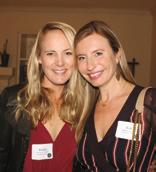
Left: Mary Allain, ‘18 (JD); Jackie Seiter, ‘15 (JD); and Brooke Arthur, ‘22 (JD).

Above: Steven Barnes, ‘20 (JD); Gaaret Marinelli, ‘21 (JD); and Arif Salam, ‘24 (JD).

Right: Ben Cooper, ‘17 (JD); Erin Lupfer, ‘17 (JD); and Law Alumni Board member/ Diversity Committee Co-Chair Joy Utomi Hartmann, ‘11 (JD).


Left: Brian Brinig , ‘79 (JD), and Lisa Brinig. Below left: Hon. M. Margaret McKeown; Professor of Practice Linda Lane; Board of Visitors member Hon. Allison Goddard, ‘00 (JD); Assistant Dean of Admissions, Financial Aid and Diversity Initiatives Tracy Simmons; past Law Alumni Board President Jim Crosby, ’83 (JD); current Law Alumni Board President and Rising Star Recent Alumni Award honoree Carolina Bravo-Karimi, ‘08 (JD); and winemakers Andrew Thompson, ‘16 (JD), and Peter Thompson, ‘80 (JD).

Saturday, Oct. 21, 2023: 1983, 1993, 1998, 2003, 2013, 2018
Saturday, Oct. 28, 2023: 1973 (50-year Golden Toreros reunion) law.sandiego.edu/reunions
Thursday, Nov. 17, 2022: Joint celebration of the 10-year anniversary of the Veterans Legal Clinic. law.sandiego.edu/daa
Hon. Ken Enright; Hon. Anthony Campagna, ‘98 (JD); Hon. Loren Freestone, ‘97 (JD); Hon. Judy Bae, ‘02 (JD); Hon. Victor Pippins; and Distinguished Alumni Award honoree Hon. Ana Espana, ‘79 (BA), 82 (JD).



Left: December 2021 bar passers take the State Bar of California’s attorney oath.

Above: Former Presiding Judge, San Diego County Superior Court and Distinguished Alumni Award honoree Hon. Lorna A. Alksne, ’92 (JD) (ret.); and Board of Visitors member U.S. Magistrate Judge, U.S. District Court, Southern District of California, Hon. Michael S. Berg , ’81 (JD), administered the state and federal oaths. Below: Jennifer Kraus; Mikaela Kraus,’ 21 (JD); and David Kraus, ‘91 (JD).

